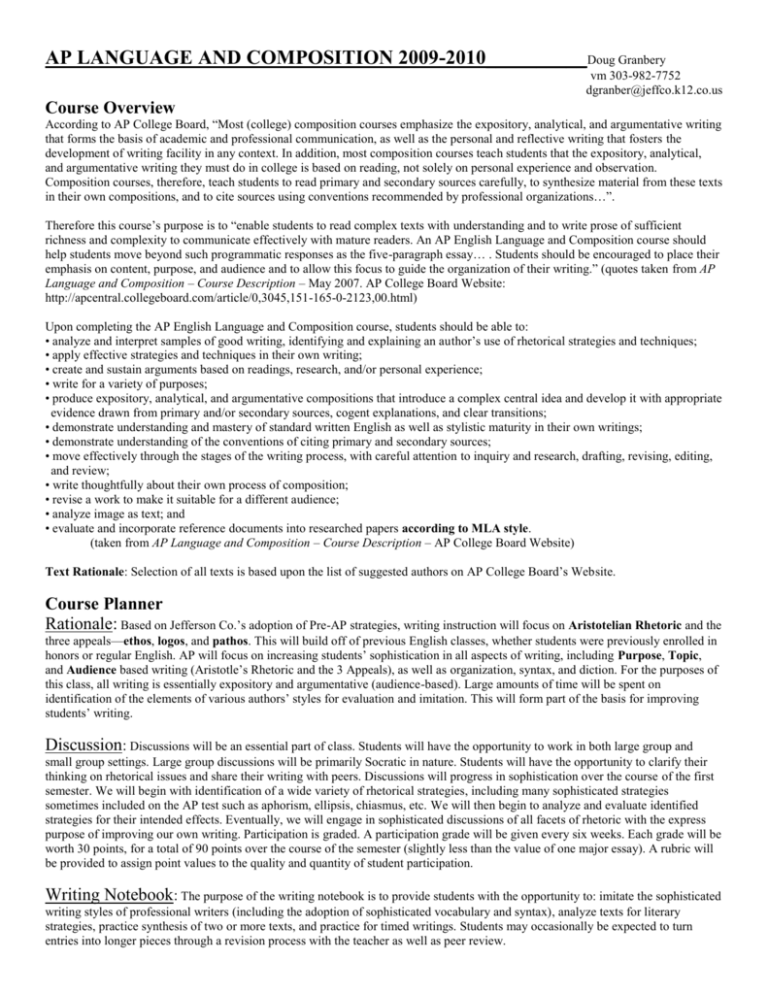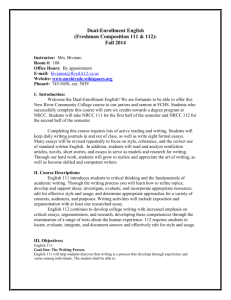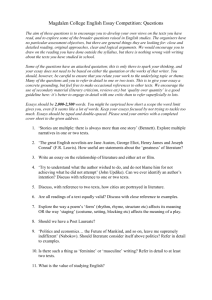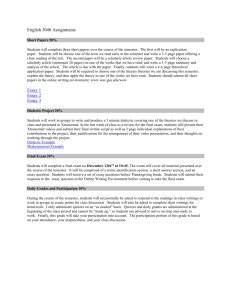
AP LANGUAGE AND COMPOSITION 2009-2010__________ Doug Granbery
vm 303-982-7752
dgranber@jeffco.k12.co.us
Course Overview
According to AP College Board, “Most (college) composition courses emphasize the expository, analytical, and argumentative writing
that forms the basis of academic and professional communication, as well as the personal and reflective writing that fosters the
development of writing facility in any context. In addition, most composition courses teach students that the expository, analytical,
and argumentative writing they must do in college is based on reading, not solely on personal experience and observation.
Composition courses, therefore, teach students to read primary and secondary sources carefully, to synthesize material from these texts
in their own compositions, and to cite sources using conventions recommended by professional organizations…”.
Therefore this course’s purpose is to “enable students to read complex texts with understanding and to write prose of sufficient
richness and complexity to communicate effectively with mature readers. An AP English Language and Composition course should
help students move beyond such programmatic responses as the five-paragraph essay… . Students should be encouraged to place their
emphasis on content, purpose, and audience and to allow this focus to guide the organization of their writing.” (quotes taken from AP
Language and Composition – Course Description – May 2007. AP College Board Website:
http://apcentral.collegeboard.com/article/0,3045,151-165-0-2123,00.html)
Upon completing the AP English Language and Composition course, students should be able to:
• analyze and interpret samples of good writing, identifying and explaining an author’s use of rhetorical strategies and techniques;
• apply effective strategies and techniques in their own writing;
• create and sustain arguments based on readings, research, and/or personal experience;
• write for a variety of purposes;
• produce expository, analytical, and argumentative compositions that introduce a complex central idea and develop it with appropriate
evidence drawn from primary and/or secondary sources, cogent explanations, and clear transitions;
• demonstrate understanding and mastery of standard written English as well as stylistic maturity in their own writings;
• demonstrate understanding of the conventions of citing primary and secondary sources;
• move effectively through the stages of the writing process, with careful attention to inquiry and research, drafting, revising, editing,
and review;
• write thoughtfully about their own process of composition;
• revise a work to make it suitable for a different audience;
• analyze image as text; and
• evaluate and incorporate reference documents into researched papers according to MLA style.
(taken from AP Language and Composition – Course Description – AP College Board Website)
Text Rationale: Selection of all texts is based upon the list of suggested authors on AP College Board’s Website.
Course Planner
Rationale: Based on Jefferson Co.’s adoption of Pre-AP strategies, writing instruction will focus on Aristotelian Rhetoric and the
three appeals—ethos, logos, and pathos. This will build off of previous English classes, whether students were previously enrolled in
honors or regular English. AP will focus on increasing students’ sophistication in all aspects of writing, including Purpose, Topic,
and Audience based writing (Aristotle’s Rhetoric and the 3 Appeals), as well as organization, syntax, and diction. For the purposes of
this class, all writing is essentially expository and argumentative (audience-based). Large amounts of time will be spent on
identification of the elements of various authors’ styles for evaluation and imitation. This will form part of the basis for improving
students’ writing.
Discussion: Discussions will be an essential part of class. Students will have the opportunity to work in both large group and
small group settings. Large group discussions will be primarily Socratic in nature. Students will have the opportunity to clarify their
thinking on rhetorical issues and share their writing with peers. Discussions will progress in sophistication over the course of the first
semester. We will begin with identification of a wide variety of rhetorical strategies, including many sophisticated strategies
sometimes included on the AP test such as aphorism, ellipsis, chiasmus, etc. We will then begin to analyze and evaluate identified
strategies for their intended effects. Eventually, we will engage in sophisticated discussions of all facets of rhetoric with the express
purpose of improving our own writing. Participation is graded. A participation grade will be given every six weeks. Each grade will be
worth 30 points, for a total of 90 points over the course of the semester (slightly less than the value of one major essay). A rubric will
be provided to assign point values to the quality and quantity of student participation.
Writing Notebook: The purpose of the writing notebook is to provide students with the opportunity to: imitate the sophisticated
writing styles of professional writers (including the adoption of sophisticated vocabulary and syntax), analyze texts for literary
strategies, practice synthesis of two or more texts, and practice for timed writings. Students may occasionally be expected to turn
entries into longer pieces through a revision process with the teacher as well as peer review.
Entries will consist of three types:
1. Content: Students will clearly assert the author’s argument and then defend, challenge, or qualify the author’s argument,
noting the complexity of the issue and any possible objections to the student’s view on the issue.
2. Style: Students will identify and evaluate the author’s style (based on purpose, content, and audience).
3. Synthesis: Students will synthesize a teacher-provided graphic or visual image (or additional texts, using MLA style where
necessary) as it relates to the written text.
Students will have the opportunity to read other students’ writing and offer feedback. The teacher will also offer feedback—less
frequently. This notebook will be used infrequently with assigned readings. Entries will be approximately 1 to 2 pages.
Timed Writings and Multiple Choice
In order to practice for the AP Language and Composition test, students will take both timed writings and multiple choice tests every
other week. All timed writings will be released questions from previous AP tests. They will be scored using the AP College Board 9
point rubric used in scoring the real test. Occasionally, students will be expected to evaluate their own timed writings as well as their
peers’. The first two timed writings will be revised by the student after evaluation by the teacher. On specified block days, back-toback timed writings will approximate the longer AP test scenario.
Multiple choice tests will usually comprise one or two texts followed by approximately 8 AP test style questions. Students will also
be required to generate their own multiple choice questions. Most of these tests will be timed; however, not all will be for a grade.
Occasionally, practice texts will be given.
NOTE: Approximately 3 weeks prior to the test, a full length practice test will be offered and scored like the real AP test.
Major Essays
There will be at least 3 (possibly 4) major papers per semester. These are medium length (3-5 pages), polished pieces of writing in
which students can attempt and perfect more sophisticated writing techniques like those practiced in the Writing Notebook. All
essays will be expository, analytical, and persuasive in nature (following Aristotle’s Rhetoric and the 3 Appeals—Ethos, Logos,
Pathos—with attention to purpose, content, and audience). Each essay will emphasize a different pattern of development (cause/effect,
division/classification, narration, comparison/contrast, definition, etc.) Prompts will be provided, but students may submit their own
topics for approval. Essays must follow MLA guidelines for research papers. Rubrics will be provided. We will follow a rigorous
schedule of draft, revision, edit, submission, which will include both peer and instructor review of drafts.
Students will have the opportunity to re-write at the instructor’s discretion. (Ask me—I sometimes say yes.)
Reading
Students will have nightly reading homework, approximately 4 to 5 essays per week. Students are expected to do a close reading of
all texts. This requires reading all texts twice and marking them for both content and style. As stated above, these texts will serve
as models of good writing and for critical evaluation. These texts are the basis for discussions, so students must be very familiar with
them upon arrival to class. In addition to the Writing Notebook, this will serve to enrich student vocabulary.
The following is a tentative list of required readings (left column) for each essay (right column):
First Semester
Once More to the Lake, E.B. White The Jacket, Gary Soto
Sister Flowers, Maya Angelou
Shooting an Elephant, George Orwell
The Chase, Annie Dillard
Salvation, Langston Hughes
The Fourth of July, Audre Lorde Me Talk Pretty One Day David Sedaris
Narration/Description Essay (general audience)
Due Date:_______
FROM THIS POINT ON THE SEMESTER IS STILL UNDER CONSTRUCTION!
The “Values” Wasteland, Charles Sykes
Sexism and Language, Alleen Pace Nilsen
Tweens: Ten Going on Sixteen, Kay Hymowitz
Bombs Busting in Air, Beth Johnson
What I’ve Learned from Men, Barbara Ehrenreich
Propaganda Techniques in Today’s Advertising, Ann McClintock
Exemplification or Division/Classification
But What do You Mean?,Deborah Tannen
(general audience) Due:_______
And Then I Went To School, Joseph H. Suina
Workers, Richard Rodriguez
The Ugly Truth About Beauty, Dave Barry
The Prisoner’s Dilemma, Stephen Chapman
Time to Think About Torture, Jonathan Alter
Now the Big Talk is about Bringing Back Torture, Henry Porter
Rape: A Bigger Danger than Feminists Know, Camille Paglia
Common Decency, Susan Jacoby
Comparison/Contrast (Teacher is audience)
Due:_______
Second Semester STILL UNDER CONSTRUCTION!
Title Essay (Use a title from 1st semester as your own, then
write an essay that shows off your skills and is
appropriate for the given title)
(Teacher is audience)
Due:_______
Selected titles from First Semester*
Growing Up in Los Angeles, Richard Rodriguez
Two Cheers for Hypocrisy, P.J. O’Rourke
One essay on Adolescence of your own choosing
Adolescence Essay (Synthesis/Analysis/Comp.ContEssay)
(Peer audience)
Due:_______
Readings depend on selected topic (but approx. 3 essays)
Topics: Gun Control, Cloning, Alternative Energy,
Isolationism, or submit your own.
NOTE: essays must use MLA
documentation style
Research Essay and Group Project
(Teacher audience)
Due:_______
Supersize Me!, Morgan Spurlock (video)
Documentary Essay (Critical Analysis)
(Peer audience)
Due:________
_____________________________________________________________________________
Resource List
Cohen, Samuel. 50 Essays: A Portable Anthology. New York: Bedford/St. Martin’s, 2004.
Cooley, Thomas. The Norton Sampler. 5th ed. New York: Norton, 1997.
DiYanni, Robert. Fifty Great Essays. 2nd ed. New York: Penguin, 2005.
Nadell, Judith, et al. The Longman Reader. 7th ed. New York: Pearson Longman, 2005.
Spurlock, Morgan. Supersize Me!
Trimmer, Joseph F. and Hairston, Maxine. The Riverside Reader. 6th ed. New York: Houghton Mifflin, 1999.
_____________________________________________________________________________
Classroom Policies
READ CAREFULLY
Cell Phones and iPods: There are appropriate and inappropriate uses of cell phones and iPods. We will define these in class.
Violations (inappropriate uses of either cell phones or iPods) will result in an initial warning followed by confiscation. PARENTS
PLEASE NOTE: Teacher is not responsible for theft or damage of confiscated cell phones or iPods. (I will lock them up)
Appropriate-Inappropriate-Attendance Policy: The WRHS attendance policy will be enforced.
Mr. Granbery’s Tardy Policy: Every 3rd unexcused tardy temporarily lowers your class grade a full letter grade. However, a tardy
can be made up by attending Access on time (starts at 2:35 pm). At the end of the semester, a date will be announced past which no
tardies may be made up. All tardies not made up at the end of the semester are permanent and will affect your final grade.
Multiple Choice and Timed Writings: Strict AP test rules means no talking or handing anyone anything, and no electronic devices.
Any talking whatsoever will result in a grade of zero. (This sort of behavior could result in your dismissal from the real AP test!)
Relaxed rules means iPods are acceptable and very quiet whispering (about non-test related info.) is tolerated if it doesn’t become a
problem. These rules are reserved for practice tests only!
I understand and will abide by the policies for AP English Language and Composition as stated in the syllabus,
including the tardy, attendance, and cell phone/iPod policies.
Period ___________
Student______________________________Signature_________________________________
Parent_______________________________Signature_________________________________








